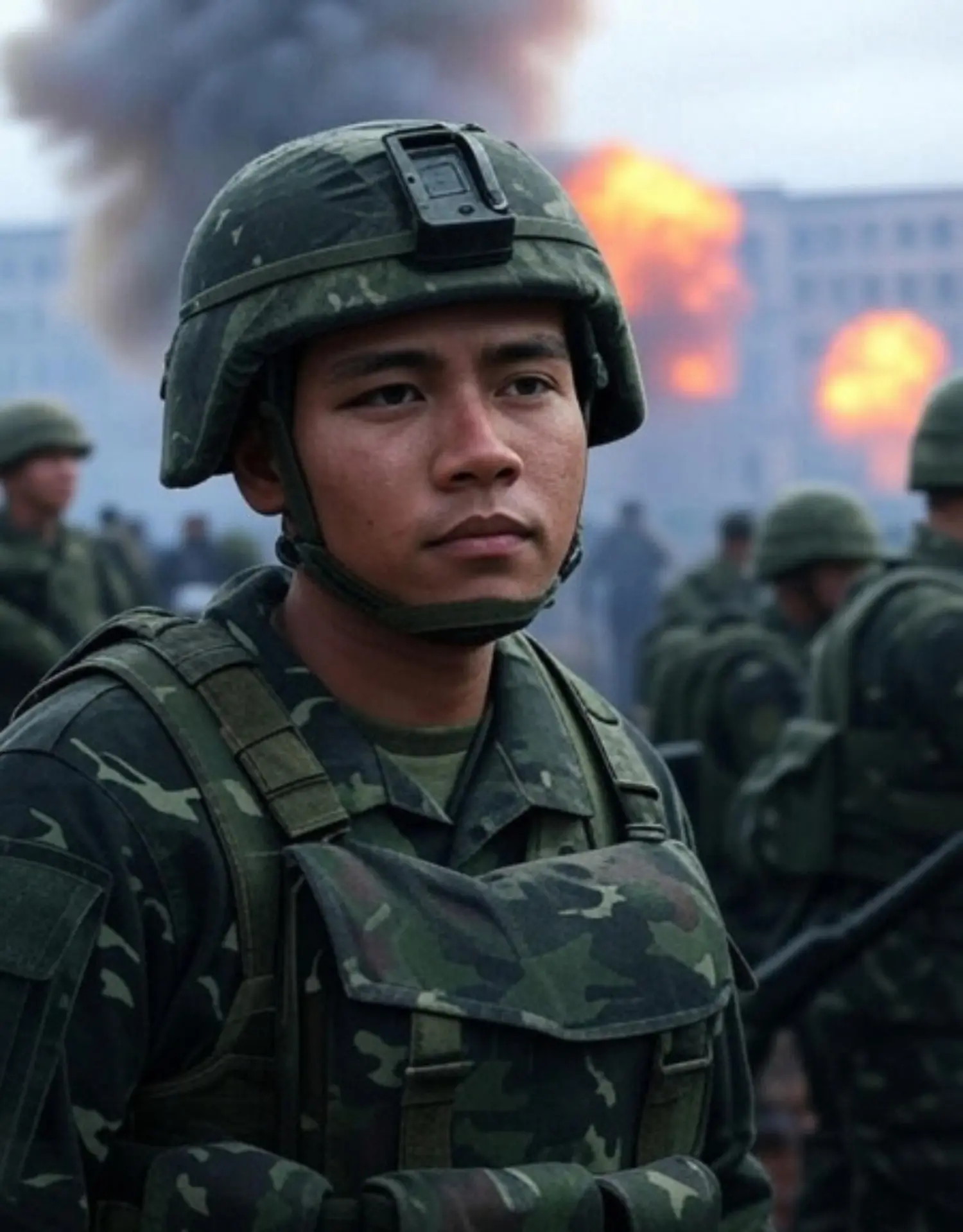
Reacting to street protests staged against rampant government corruption and the sudden resignation of the lower house Speaker, some within Philippine politics have begun whispering rumors of an impending military coup, a’ la Thailand or Cambodia. This brief analysis takes a ground floor look at the potential of such occurring in the near future.
Background
In the wild, wild west environment of Philippine politics, where dynastic rivalries often eclipse policy debates, speculation about a military coup has long been a recurring theme. As of September 2025, the nation remains gripped by the escalating feud between President Ferdinand “Bongbong” Marcos Jr. and Vice President Sara Duterte, daughter of former President Rodrigo Duterte. The scenario in question, a swift intervention – whether invited or through force – by the Armed Forces of the Philippines (AFP) to oust Marcos Jr. or dissolve Congress and/or the Judiciary, evokes memories of the turbulent 1980’s. With midterm elections months in the past and institutional checks in place, how plausible is such an event in the coming months?
The Fractured Marcos-Duterte Alliance
The roots of the current crisis trace back to the 2022 elections, when BBM (Marcos Jr.) and Sara Duterte forged an unlikely alliance under the “UniTeam” banner, propelling Marcos to the presidency and Sara to the vice presidency. This partnership symbolized a reconciliation between two of the country’s most powerful political clans and an attempt to bury decades of public animosity stemming from the 1986 People Power Revolution that ended Ferdinand Marcos Sr.’s dictatorship.
However, cracks emerged almost immediately. Rodrigo Duterte’s influence loomed large, with his “war on drugs” legacy and populist appeal clashing with Marcos’s more measured approach to governance, including closer ties to the United States and a pivot away from China. By mid-2024, the public spats escalated. Sara resigned from Marcos’s cabinet in June of that year amid corruption accusations. Rodrigo Duterte was arrested and extradited to the International Criminal Court (ICC) in The Hague to stand trial for crimes against humanity related to extrajudicial killings eight months later.
The flashpoint arrived with the May 12, 2025, midterm elections, which served as a proxy battleground for the clans. Marcos’s camp sought to consolidate power in the Senate and House, while the Dutertes rallied their base in Mindanao and among populist voters in the rest of the country. Results were a mixed bag but tilted against Marcos. His allies secured fewer Senate seats than anticipated, weakening his legislative hold, while Duterte-backed candidates dominated local races, including strong performances in Davao. Rodrigo, from detention in The Hague, mobilized voters with messaging delivered through family proxies, breathing new life into the Duterte brand.
Post-election, the feud intensified. Impeachment complaints against Sara’s alleged misuse of confidential funds were filed but struck down as unconstitutional by the Supreme Court in July 2025, moving the Senate trial back to February 2026. Budgetary skirmishes are ongoing, with Marcos’s administration scrutinizing the Office of the Vice President’s (OVP) expenditures, including over P30 million on Sara’s travels this year. She maintains no government funds were used. A recent presidential announcement relating to fiscal reforms or security council revamps has reportedly “shocked” Sara, fueling perceptions of a purge. Yet, for the time being, she remains firmly in office, attending international events like a thanksgiving in Kuwait in August and defending her budget allocations publicly.
This dynastic standoff has polarized the electorate, with elite resentments spilling into public discourse which, luckily, have largely been played out through parliamentarian and legal channels, not extrajudicial means. Presently, attention has turned away from clan politics and toward the flood control corruption scandals that have induced large, sometimes violent street protests and vitriolic social media campaigns.
AFP Loyalty to the Constitution Over Personalities
Any assessment of a military coup of course centers on the AFP, an institution with a checkered history. The 1980’s saw multiple reformist actions against Marcos Sr., culminating in his ouster, but post-1986 reforms under the 1987 Constitution emphasized civilian supremacy and professionalization, inducing coups against Cory Aquino conducted by rebel units loyal to the Marcoses. Under BBM, the military has received boosts in funding and modernization, particularly for South China Sea defense, aligning it closely with the president’s agenda.
Recent statements from AFP leadership underscore unwavering loyalty to the chain of command. In May 2025, amid election-season rumors, Chief of Staff General Romeo Brawner Jr. declared, “No coup shall happen. Not on my watch,” dismissing speculations as “noise” and reaffirming commitment to the Constitution. Similar pledges came in January, when Brawner labeled military intervention “not a solution” to societal woes. Even earlier, in November 2024, amid initial feud escalations, the AFP reiterated its apolitical stance.
Substantiation confirmation of coup rumors in September 2025 yield nothing regarding the military. Instead, “coup” references pertain to congressional infighting, such as the ousting of Senate President Chiz Escudero by Tito Sotto over flood control scandals, or warnings from Senator Panfilo Lacson about Senate majority instability. Broader online sentiment on platforms like X shows no traction for military coup narratives since August; discussions focus on political drama, not AFP intervention.
The AFP’s institutional evolution supports this stability. Modernization efforts, including U.S.-backed training and equipment, have tied the military to democratic norms. Key officers, including Brawner (appointed in 2023), have no overt Duterte ties – unlike some in Rodrigo’s era, when loyalists like his eldest son Paolo held influence. Sara Duterte, while popular in military-heavy regions like Davao, lacks a clear command structure within the AFP to orchestrate a putsch. A coup installing her would require mid-level officers to defy superiors, risking fragmentation and international backlash from allies like the U.S., which views Marcos as a stable partner against China.
Why a Coup Is Unlikely in the Near Term
Several factors militate against a coup in the next few months (October-December 2025):
- Post-Midterm Stabilization: The May elections, while bruising for Marcos, did not trigger immediate chaos. His administration retains control of the executive and a slim congressional majority. The Supreme Court’s intervention in Sara’s impeachment signals judicial independence, diffusing immediate threats.
- Military Professionalism: Unlike the 1980s, when factionalism was rife, today’s AFP is more unified. Brawner’s repeated denials, coupled with no evidence of dissent, suggest cohesion. Rumors from earlier in 2025 (e.g., around Rodrigo’s arrest) fizzled without action.
- Public and International Dynamics: Filipinos, scarred by past coups, largely favor democratic processes – evident in the 2022 vote. Regime change via military fiat could alienate urban voters and invite sanctions; the U.S. has deepened defense ties under Marcos, including EDCA base expansions. Rodrigo’s ICC woes already tarnish the family; a coup favoring his clan would amplify global isolation.
Taking the above points into account, risks persist. If economic woes (e.g., inflation, flooding, and typhoon recovery) or South China Sea escalations erode Marcos’s support, mid-level discontent could brew. The Dutertes’ regional strongholds might provide a base for unrest, and Rodrigo’s ongoing trial – if he isn’t sent home due to being declared medically unfit for court – could rally hardliners. Historical precedents show coups often stem from perceived corruption or weakness, both of which plague Marcos’s image amid the flood control project scandals.
It should be noted herein that these are long-term pressures. In the immediate horizon, no catalysts such as military purges appear imminent.
Conclusion: Low Probability, But Vigilance Required
The likelihood of an AFP-led coup ousting Bongbong Marcos within the next few months is low – perhaps 10-15% at most. The military’s repeated loyalty pledges, absence of current chatter, and institutional safeguards outweigh the dynastic feud’s intensity. Philippine politics thrives on drama, but the post-1987 framework has proven resilient, channeling conflicts into ballots and courts rather than armored columns.
For stability, Marcos must navigate Senate fragility and budgetary fights diplomatically, while Sara leverages her popularity without overreaching. International actors, particularly the U.S., should monitor closely to deter adventurism. Ultimately, the 2028 presidential race looms as the true battleground, where voters- not generals – will decide the families’ fates. Until then, speculation serves mostly as political theater and social media fodder.


